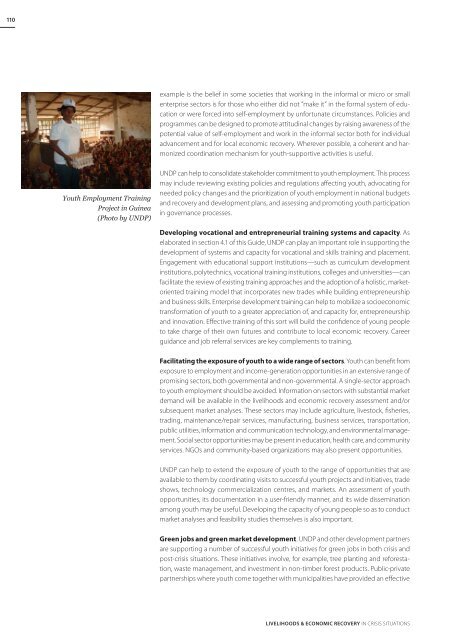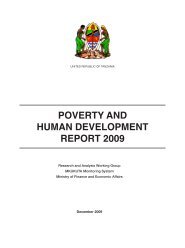Download PDF (4.08 MB) - ReliefWeb
Download PDF (4.08 MB) - ReliefWeb
Download PDF (4.08 MB) - ReliefWeb
You also want an ePaper? Increase the reach of your titles
YUMPU automatically turns print PDFs into web optimized ePapers that Google loves.
110<br />
example is the belief in some societies that working in the informal or micro or small<br />
enterprise sectors is for those who either did not “make it” in the formal system of education<br />
or were forced into self-employment by unfortunate circumstances. Policies and<br />
programmes can be designed to promote attitudinal changes by raising awareness of the<br />
potential value of self-employment and work in the informal sector both for individual<br />
advancement and for local economic recovery. Wherever possible, a coherent and harmonized<br />
coordination mechanism for youth-supportive activities is useful.<br />
Youth Employment Training<br />
Project in Guinea<br />
(Photo by UNDP)<br />
UNDP can help to consolidate stakeholder commitment to youth employment. This process<br />
may include reviewing existing policies and regulations affecting youth, advocating for<br />
needed policy changes and the prioritization of youth employment in national budgets<br />
and recovery and development plans, and assessing and promoting youth participation<br />
in governance processes.<br />
Developing vocational and entrepreneurial training systems and capacity. As<br />
elaborated in section 4.1 of this Guide, UNDP can play an important role in supporting the<br />
development of systems and capacity for vocational and skills training and placement.<br />
Engagement with educational support institutions—such as curriculum development<br />
institutions, polytechnics, vocational training institutions, colleges and universities—can<br />
facilitate the review of existing training approaches and the adoption of a holistic, marketoriented<br />
training model that incorporates new trades while building entrepreneurship<br />
and business skills. Enterprise development training can help to mobilize a socioeconomic<br />
transformation of youth to a greater appreciation of, and capacity for, entrepreneurship<br />
and innovation. Effective training of this sort will build the confidence of young people<br />
to take charge of their own futures and contribute to local economic recovery. Career<br />
guidance and job referral services are key complements to training.<br />
Facilitating the exposure of youth to a wide range of sectors. Youth can benefit from<br />
exposure to employment and income-generation opportunities in an extensive range of<br />
promising sectors, both governmental and non-governmental. A single-sector approach<br />
to youth employment should be avoided. Information on sectors with substantial market<br />
demand will be available in the livelihoods and economic recovery assessment and/or<br />
subsequent market analyses. These sectors may include agriculture, livestock, fisheries,<br />
trading, maintenance/repair services, manufacturing, business services, transportation,<br />
public utilities, information and communication technology, and environmental management.<br />
Social sector opportunities may be present in education, health care, and community<br />
services. NGOs and community-based organizations may also present opportunities.<br />
UNDP can help to extend the exposure of youth to the range of opportunities that are<br />
available to them by coordinating visits to successful youth projects and initiatives, trade<br />
shows, technology commercialization centres, and markets. An assessment of youth<br />
opportunities, its documentation in a user-friendly manner, and its wide dissemination<br />
among youth may be useful. Developing the capacity of young people so as to conduct<br />
market analyses and feasibility studies themselves is also important.<br />
Green jobs and green market development. UNDP and other development partners<br />
are supporting a number of successful youth initiatives for green jobs in both crisis and<br />
post-crisis situations. These initiatives involve, for example, tree planting and reforestation,<br />
waste management, and investment in non-timber forest products. Public-private<br />
partnerships where youth come together with municipalities have provided an effective<br />
Livelihoods & Economic Recovery in Crisis Situations





